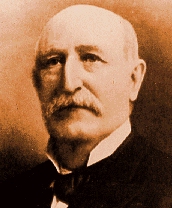
Fifty-year-old Lewis Shepherd was probably the most prominent member of the Chattanooga bar in 1906. He was a former judge and state legislator who decided he was most at home in the courtroom. He told friends "he loved the battle too much" and wasn't born to sit "high on a bench in a cheap robe" or serve in a legislature with "men with less intelligence than my wife's mule."
Two days after the well-publicized arrest of Ed Johnson on the charge of rape, Shepherd spotted Judge McReynolds in a local restaurant. Shepherd stopped by the judge's table to greet him. Shepherd told the judge that the case was an important one and that "you need to have one of the older members of the criminal bar involved." McReynolds replied, "Why don't I appoint you?" The next day Shepperd's appointment, along with that of his co-counsel Robert Cameron and W. G. M. Thomas, was formalized.
Unlike his two fellow defense attorneys, Shepherd wanted the assignment. Shepherd believed strongly in protecting the rights of accused persons--especially when he suspected the accused person might have been the victim of racial discrimination. He often represented African-American clients. Moreover, Shepherd enjoyed the attention of the press. He quickly threw himself into the work of plotting trial strategy, interviewing his client, lining up alibi witnesses, and investigating the credibility of the key prosecution witness, Will Hixon.
Shepherd objected strongly to Judge McReynold's handling of the Johnson case. He complained about the judge's refusal to delay the trial, his unwillingness to move the trial out of Chattanooga, and what he thought was the judge's pro-prosecution bias in his questioning of witnesses and trial rulings. In his summation in the Johnson trial, Shepherd said, " This case wasn't about justice....Justice and truth and the rule of law have been trampled on in this court and in this very case." When the jury returned its guilty verdict, Shepherd urged an appeal, but was outvoted by his two co-counsel who feared such an effort would only lead to a lynching.
When Johnson reversed his original decision and decided to appeal after all, Noah Parden came to Shepherd and asked him to join with him and Styles Hutchins in the effort to secure a new trial. Shepherd, despite his full appreciation of the effects the decision might have on his career and even personal safety, consented to Parden's request.
On the day word reached Chattanooga that the Supreme Court of the United States had voted to stay the execution of Ed Johnson, Lewis Shepherd invited Parden and Hutchins to his retreat on the Georgia side of Lookout Mountain to celebrate their great victory. That night, Ed Johnson was lynched.
After a number of Chattanooga citizens, including Sheriff Shipp, were indicted for criminal contempt in connection with the Johnson lynching, Shepherd found nine new clients: defendants in the contempt trial.
Shepherd continued his legal practice in Chattanooga until May 14, 1917, when--while arguing a legal issue in a courtroom--he collapsed and never regained consciousness. The Chattanooga Times reported that Shepherd's last wish was satisfied: "to go to his reward straight from the courtroom."
